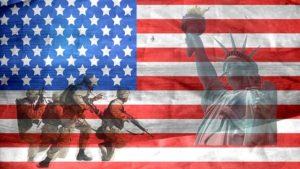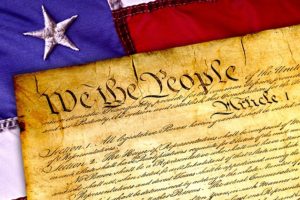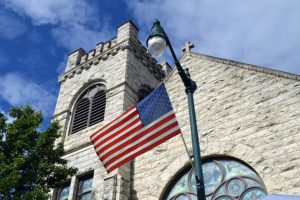
Shouts. Hoofbeats. Marching feet. Drum and fife. Gunshots. Singing. Tolling bells. Freedom echoes down the portals of time, echoes bouncing off the pages of history into the present.
Behind the fireworks, food, and festivities are lost lives, changed lives, tears, and fears. Behind the celebration of freedom is sacrifice.

Freedom Leaders
As a writer, I’ve always wondered what it was like to pen something as significant and monumental as the Declaration of Independence. Did Thomas Jefferson welcome the challenge? Did sentences form in his head faster than he could dip quill to ink pot? Or did he sit and ponder, staring at blank parchment as he considered the magnitude of what he was about to write.
Thomas Jefferson studied at the College of William and Mary in Williamsburg prior to beginning the practice of law. Jefferson entered the Virginia House of Burgesses just as the rumble of opposition to British taxation was increasing, and in 1774, he wrote a pamphlet about the rights of British Americans.
At the second Continental Congress, in June of 1776, Jefferson was appointed to a 5-member committee, along with John Adams, Benjamin Franklin, Robert Livingston, and Roger Sherman. Although an awkward speaker, Jefferson, already distinguished as a gifted writer, was chosen to draft the Declaration of Independence by the other committee members, who read, made suggestions, and agreed to the document before it was presented. Jefferson, however, was the primary author.

Personal Freedom
Voicing opinions without fear of reprisal is a cherished liberty, but often, proponents of personal freedoms seek to limit the freedoms of those they oppose. They demand acceptance for their choices while working to silence others. They criticize leaders and decry constitutional freedoms with which they don’t agree.
Personal freedom should never negate the freedom of others. Freedom stands on the shoulders of history, and forward motion does not mean advancing some freedoms while hobbling others.

Religious Freedom
Our Founding Fathers risked much to secure the freedoms we enjoy today. But increasingly, religious freedom, the very reason many of our Founding Fathers came to this country, is challenged in America. Scoffers malign faith in God, criticize those who pray, or seek to pass laws limiting the right to maintain moral and religious values and express them publicly. But religious freedom is worth protecting.
It’s time for people of faith to lead the way, like freedom leaders before us, and stand firm for the religious liberty our forefathers fought so hard to secure.
The greatest liberty one can experience is the freedom to believe and receive salvation through Jesus Christ. Cherish your freedoms and don’t let others rob you of them.
What is your definition of freedom? What freedoms are most important to you?
“You are free, but still you are God’s servants, and you must not use your freedom as an excuse for doing wrong” (1 Peter 2:16 CEV).
*Portions of this post excerpted from Freedom Leaders

©CandyArrington
Candy Arrington is an award-winning writer, blogger, and speaker. She often writes on tough topics with a focus on moving through, and beyond, difficult life circumstances. Candy has written hundreds of articles, stories, and devotions published by numerous outlets including: Inspiration.org, Arisedaily.com, CBN.com, Healthgrades.com, Care.com, Focus on the Family, NextAvenue.org, CountryLiving.com, and Writer’s Digest. Candy’s books include Life on Pause: Learning to Wait Well (Bold Vision Books), When Your Aging Parent Needs Care (Harvest House), and AFTERSHOCK: Help, Hope, and Healing in the Wake of Suicide (B&H Publishing Group).
To receive Candy’s blog, Forward Motion, via email, go to https://candyarrington.com/blog/ and scroll to the bottom of the page to sign up.


2 Comments
Beautiful tribute to our freedoms, Candy. Thank you.
Thanks, Chris!